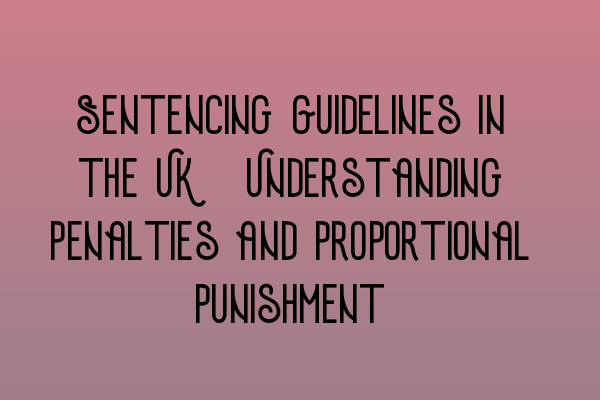Sentencing Guidelines in the UK: Understanding Penalties and Proportional Punishment
Sentencing is a critical aspect of the criminal justice system in the United Kingdom. It aims to ensure that offenders receive fair and proportional punishment for their crimes. The sentencing guidelines provide a framework for judges and magistrates to determine the appropriate penalties for different offenses, taking into account the severity of the crime, the culpability of the offender, and the impact on victims and society.
Understanding Sentencing Guidelines
The Sentencing Council for England and Wales is responsible for issuing guidelines that outline the principles and factors to consider when sentencing individuals convicted of criminal offenses. These guidelines are intended to promote consistency and transparency in sentencing decisions, ensuring that similar cases are treated similarly.
When determining an appropriate sentence, the courts consider various factors, including the offender’s previous convictions, the level of harm caused, any mitigating or aggravating factors, and the need to protect the public. By taking these factors into account, the courts aim to achieve the principles of proportionality, deterrence, rehabilitation, and reparation.
The sentencing guidelines cover a wide range of offenses, from minor offenses such as theft or common assault to more serious crimes like murder or drug trafficking. Each offense is categorized into specific harm levels or categories, which guide the courts in determining the starting point for the sentence. The guidelines also provide a range of sentences, allowing the courts to adjust the penalty based on the individual circumstances of each case.
Penalties for Different Offenses
The severity of the penalties for criminal offenses in the UK varies depending on the nature of the crime. Offenses are generally categorized as either summary, indictable, or either-way offenses, with different maximum penalties for each category.
- Summary Offenses: These are minor offenses that can be heard by magistrates in the magistrates’ court. They carry a maximum penalty of 6 months’ imprisonment and/or a fine.
- Indictable Offenses: These are more serious offenses that are heard in the Crown Court before a judge and jury. They carry higher maximum penalties, including life imprisonment for the most severe crimes.
- Either-Way Offenses: These offenses can be heard in either the magistrates’ court or the Crown Court, depending on their seriousness. The court decides on the appropriate venue based on factors such as the level of harm and complexity of the case.
It’s worth noting that the courts have discretion when imposing sentences within the statutory range for each offense. They consider various factors, such as the offender’s culpability, previous convictions, and any mitigating or aggravating circumstances, to ensure that the punishment is proportionate to the crime.
The Role of Mitigation and Aggravation
When determining the appropriate sentence, the courts also consider any factors that may reduce or increase the seriousness of the offense. Mitigating factors, such as genuine remorse, cooperation with the authorities, or a plea of guilty, can lead to a lesser sentence. On the other hand, aggravating factors, such as previous convictions, use of weapons, or targeting vulnerable victims, can result in a more severe penalty.
Understanding the impact of these factors on sentencing decisions is crucial for defendants and their legal representatives. It allows them to build a strong defense strategy and present the most persuasive case in court.
In conclusion, the sentencing guidelines play a crucial role in ensuring that penalties for criminal offenses in the UK are fair, proportional, and consistent. By taking into account the nature of the offense and the individual circumstances of each case, the courts strive to achieve justice and maintain public confidence in the criminal justice system.
If you’d like to learn more about legal topics in the UK, be sure to check out these related articles:
- Demystifying the Solicitors Qualifying Examination Format
- LLC Formation Made Simple: Step-by-Step Guide for UK Entrepreneurs
- LLC Formation: A Step-by-Step Guide for UK Entrepreneurs
- Business Regulations in the UK: A Comprehensive Overview
- Ethical Considerations in UK Law: Upholding Professional Standards
